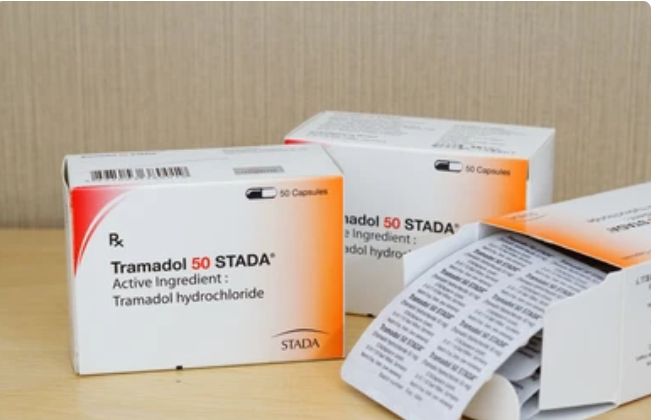
Introduction
Tramadol addiction has become a widespread crisis in Ghana, affecting individuals, families, and the broader society. Initially introduced as a prescription painkiller, Tramadol is now one of the most abused opioids in the country. The rise in Tramadol addiction has led to severe consequences, including school dropout, family breakdown, and increased crime rates. With illicit supply channels fueling its accessibility, Ghana faces a mounting challenge in combating Tramadol abuse.
Understanding Tramadol and Its Effects
Tramadol is a synthetic opioid used to treat moderate to severe pain. While it is medically approved in doses of 50mg to 100mg, illegally distributed variants containing up to 500mg are widely available in Ghana. This unregulated use has significantly contributed to addiction, particularly among the youth and labor force.
Effects of Tramadol Abuse

The effects of Tramadol abuse range from mild to life-threatening, impacting both mental and physical health:
Euphoria and Dependence: Regular misuse leads to a cycle of dependence, making it difficult to quit.
Cognitive Impairment: Users experience confusion, poor judgment, and slow reaction times, which are dangerous for students and workers.
Seizures and Overdose: High doses cause seizures, respiratory depression, and even death.
Depression and Psychosis: Long-term abuse has been linked to mental health disorders, including anxiety and hallucinations.
Organ Damage: Prolonged use damages the liver and kidneys, leading to chronic illnesses.
The Rising Trend of Tramadol Addiction in Ghana
The rise of Tramadol addiction in Ghana is fueled by several factors:
Widespread Availability: Despite regulations, Tramadol is sold illegally in markets, pharmacies, and on the streets.
Peer Pressure: Many young people begin using Tramadol under the influence of peers.
Workforce Endurance: Laborers, drivers, and motorcyclists use Tramadol to boost stamina, unaware of its harmful consequences.
Lack of Awareness: Many users are unaware of the addictive nature and long-term health risks associated with the drug.
Statistics on Tramadol Abuse in Ghana
According to the Ghana Food and Drugs Authority (FDA), Tramadol abuse accounts for over 70% of opioid-related cases in the country.
Reports indicate that 30% of school dropouts in high-risk regions are linked to drug abuse, particularly Tramadol.
In 2023, the Narcotics Control Commission seized over 20 million Tramadol pills smuggled into Ghana, highlighting the scale of the crisis.
Tramadol Addiction and Its Societal Impact
School Dropout and Educational Decline
The impact of Tramadol addiction on education is alarming. Many students who misuse the drug experience:
Poor academic performance due to lack of concentration and memory impairment.
Increased absenteeism caused by health complications.
Disciplinary issues, leading to suspension or expulsion.
Teachers and school authorities report a rise in drug-related cases, with students often caught abusing Tramadol during school hours. Many of these students eventually drop out, limiting their future opportunities and contributing to youth unemployment.
Family Breakdown and Social Disintegration

The rise in family breakdown cases due to Tramadol addiction is evident across communities in Ghana. Key issues include:
Neglect of Responsibilities: Addicted individuals often neglect their families, leading to broken homes.
Financial Strain: Families spend significant resources on medical bills and rehabilitation efforts.
Domestic Violence: Increased aggression and mood swings contribute to conflicts within households.
Crime and Security Threats

The effects of Tramadol abuse extend to crime rates, with reports of:
Increased theft as addicts struggle to finance their drug habits.
Violent crimes, including gang-related activities fueled by drug-induced aggression.
Drug trafficking, with criminal networks exploiting the high demand for Tramadol.
Government and Community Interventions
Law Enforcement Measures
The Ghanaian government has implemented several measures to combat Tramadol addiction, including:
Banning high-dose Tramadol (200mg-500mg).
Conducting raids on illegal pharmacies and street vendors.
Increasing border security to curb drug smuggling.
Despite these efforts, enforcement remains a challenge due to the high demand and widespread availability of illicit Tramadol.
Public Awareness Campaigns
Organizations such as the Ghana Health Service (GHS) and NGOs have launched awareness programs to educate citizens on the dangers of Tramadol abuse. These initiatives target:
Schools, by integrating drug education into curricula.
Workplaces, especially among transport operators and laborers.
Media campaigns, using radio, television, and social media to reach a broader audience.
Rehabilitation and Support Services

Rehabilitation efforts for Tramadol addicts remain limited in Ghana. However, some facilities provide:
Detox programs to help individuals withdraw safely.
Counseling services for psychological support.
Vocational training to reintegrate former addicts into society.
Recommendations for Addressing Tramadol Addiction in Ghana
Strengthening Drug Control Policies
Increase penalties for illegal Tramadol distribution.
Expand law enforcement resources to monitor pharmaceutical imports.
Enhance cross-border collaboration to prevent smuggling.
Expanding Rehabilitation and Treatment Services
Build more rehab centers across Ghana, especially in high-risk areas.
Provide government-funded treatment for low-income individuals.
Encourage community-based support groups to aid recovery.
Increasing Community and Parental Involvement
Parents should monitor their children’s activities and educate them on drug risks.
Community leaders should organize anti-drug forums to promote awareness.
Churches and religious groups should support addiction recovery programs.
Conclusion
Tramadol addiction in Ghana poses a severe threat to the nation’s health, economy, and social structure. The effects of Tramadol abuse, including school dropout and family breakdown, demand urgent intervention. While the government has made strides in regulating Tramadol distribution, more efforts are needed to enforce policies, expand rehabilitation services, and educate the public.
To combat this crisis effectively, a collective approach involving law enforcement, healthcare professionals, educators, and families is necessary. Only through sustained efforts can Ghana overcome the growing threat of Tramadol addiction and safeguard its future generations.